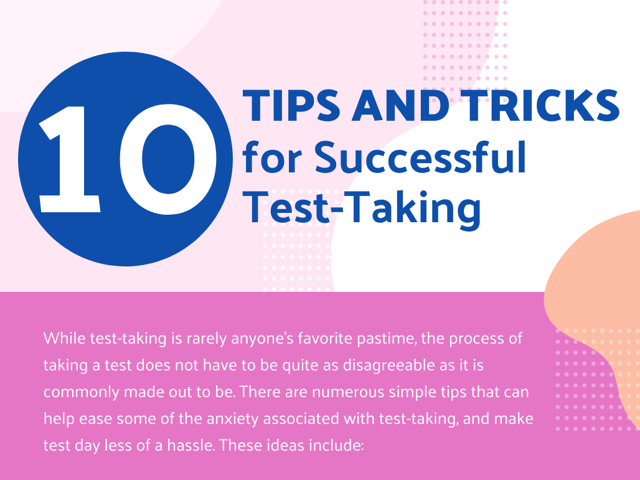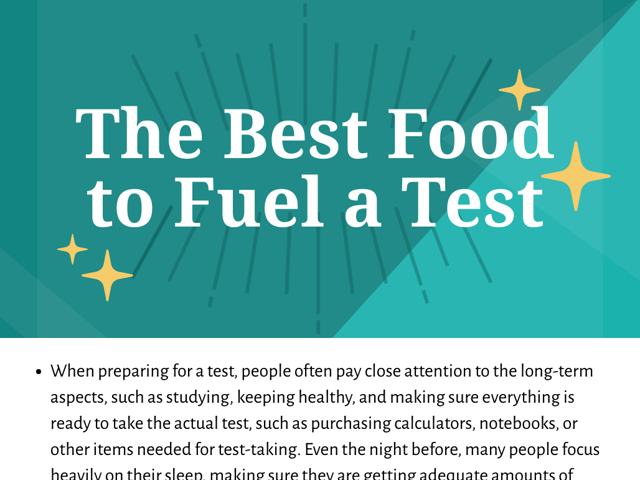
Ten Tips and Tricks for Successful Test-Taking
While test-taking is rarely anyone’s favorite pastime, the process of taking a test does not have to be quite as disagreeable as it is commonly made out to be. There are numerous simple tips that can help ease some of the anxiety associated with test-taking, and make test day less of a hassle. These ideas include:
1. Focus on Key Words in the Question
Many test questions are designed to both test your knowledge and your ability to pay close attention to what is being asked of you. Keeping this in mind, make sure to thoroughly read each test question to make sure you know what you are being asked to do or determine. Phrases such as “Which one is not” and “find the differences” will give you a clear idea of what you are supposed to be doing.
2. Focus on Key Words in a Passage
Some tests will require you to read a passage before completing the question, whether that passage is an excerpt from literature, or a paragraph-long word problem in a math test. When you read a passage, make sure you focus on any key words in the passage. These will often relate to the key words found in the question itself. If, for instance, a question asks you to find the circumference of an object, and you notice words denoting measurement, pay close attention to that portion of the passage.
3. Skim the Passage
Not all passages will need to be gone over with a fine-toothed comb from the beginning; skimming the passage can help you get a general idea of what is being asked of you or discussed, and you can then go back over any portions or ideas you think might be important.
4. Utilize the Process of Elimination
In some cases, you might be stumped, and not entirely certain of any of the answers for a given test question. In these cases, it is wise to use the process of elimination. Eliminate any answers you are certain are not correct. From there, you can continue to whittle down the answers until you feel at least somewhat content with your answer.
5. Take a Small Break
If you find your blood pressure rising, or find yourself feeling panic or fear, take a small break. Though many tests are timed, even taking a few seconds to take deep breaths and gather your wits about you can have a significant impact on how well you do on a test. When you panic, you often make mistakes that would seem trivial or be impossible in other situations. Taking time to breathe can help keep your brain on the right track.
6. Skip and Go Back
If possible, skip the questions you are not sure about, and go back to them later. Answering all of the questions you know or are comfortable with first will make sure you are keeping a close eye on time, and will help build your confidence as you navigate the remainder of the exam. Just be sure the test allows you to do this before trying it.
7. Use Scratch Paper
Whether your test is on mathematical concepts, reading comprehension, medical practice, or scientific concepts, scratch paper can help you work through questions you are not entirely sure about. Jotting down your ideas about a literature passage, working out your answer to a complex math problem, or even drawing a quick diagram of the digestive system can all be useful, effective ways to make sure you are answering a question fully and accurately.
8. Underline, Underline, Underline
If it is possible in your testing situation, underline important phrases within a question, important concepts, or even items you don’t understand. Doing so will allow you to hone in on those phrases, or keep an eye on the concepts you are struggling with, so you can keep your focus where it ought to be. It also allows you to easily go back to any questions you are struggling to complete.
9. Ask “Why” as You Go
As you read through questions, try to work out the purpose of the question. Does it want you to demonstrate your knowledge of the human skeleton? Are you being asked to evaluate the tone of the passage? Continually asking what the purpose of the question is—or what the question is trying to measure—can help you determine the answer.
10. Review Your Work
Provided that you have enough time and are allowed to do so, be sure to go back over your work. Even if you are only able to quickly skim over the work you’ve done, reviewing your answers can help you quickly identify any mistakes you’ve made as you’ve worked.
While test-taking may never be ideal, there are numerous strategies you can employ to make sure that your tests are not surrounded by frustration or fear. Tests are designed to measure your knowledge of a given subject and, armed with both a handful of techniques and a healthy dose of knowledge, taking a test can be a pain-free (or at least greatly pain-reduced) experience.

Keep Reading

Union Test Prep Blog
It’s Almost Test Day—What Should I Do?
You’re approaching the day of your test, and it’s time to take care of …

Union Test Prep Blog
What Are Holistic Admissions?
The term “holistic admissions” alternately garners horrified eye rolls …

Union Test Prep Blog
The Best Food to Fuel a Test
When preparing for a test, people often pay close attention to the long…